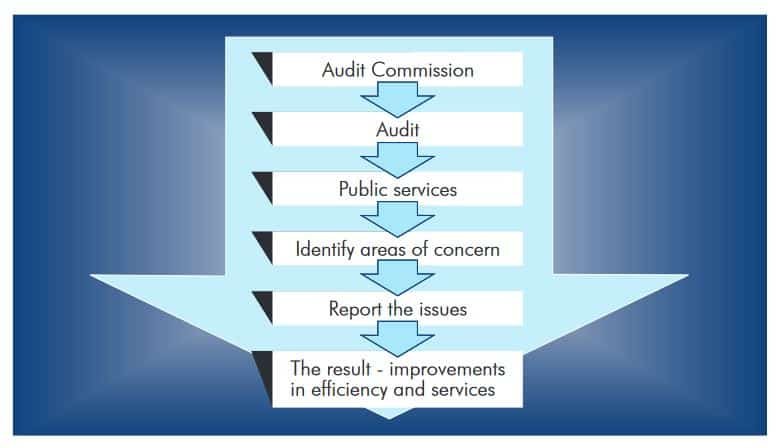
Today’s working world is dramatically different from that of the past. Charles Handy in his book, The Future of Work (1984), warned that the old patterns of work were breaking down and that new ways of working were on their way. He was right. Handy believed that modern organisations need to be flexible so that they can adapt quickly to the changing pressures that they face.
Advances in information and communications technologies have helped many businesses to:
- provide opportunities for the business to become a more inclusive employer through the development of homeworking
- motivate workers through more flexible work practices.
This case study shows how the Audit Commission has developed and implemented flexible work practices to improve its services and meet the changing needs of its staff.
What does the Audit Commission do?

The Audit Commission is an independent body that is accountable to the Office of the Deputy Prime Minister (ODPM).
The work of the Audit Commission is varied. An ‘audit’ has two main elements. It involves:
- a formal examination of a set of accounts to see if they are true and fair
- a checking of quality and efficiency
The Audit Commission investigates services in the public sector. The finance for these services comes from taxes and other sources. It ensures that this money is used properly.
The range of services audited by the Audit Commission includes:
- the criminal justice system
- local government
- the National Health Service.
The Audit Commission inspects the operations of these public services to find out how each service is performing. The advice that is given following an audit helps to provide better value for money that comes from taxation and better services for the public.
Those who work for an organisation need to know where they are going. This is often expressed in a mission statement.
The mission of the Audit Commission is ‘to be a driving force in the improvement of public services. We promote good practice and help those responsible for public services to achieve better outcomes for citizens, with a focus on those people who need public services most.’
Within the Audit Commission, there are many different jobs with varying levels of duties. Junior posts are involved with a range of administrative duties. The next level involves supervisory posts where they could be managing teams of people.
Job roles within the Audit Commission fall into three different families or groups of jobs:
- audit family
- performance audit family
- functional family.
Audit family
Those in the audit family are involved in carrying out financial audits. Most of these auditors will have professional accounting qualifications. Each team of auditors will visit clients such as local authorities or police services to carry out complex audits.
Performance audit family
The people working in the performance audit family will have worked in the public sector and have direct experience in running public services. They use their experience to help public sector managers improve the efficiency of their organisations.
Functional family
The functional family includes many others who help to ensure that the core business is run well. These people work in research posts, internal finance, human resources, information technology, communications and the legal department.
The Audit Commission is regularly faced with changing employment needs. A number of different patterns of employment have been developed to meet these needs. These include:
- full-time employees
- part-time employees
- job-sharing arrangements
- permanent and fixed term posts
- the use of temps or contractors from agencies.
These different contracts help the Audit Commission to cope with all of its changing needs. They also help it to be flexible.
There are three main types of flexibility:
- numerical flexibility
- functional flexibility
- place-of-work flexibility.
Numerical flexibility
The Audit Commission is constantly faced with peaks and troughs in the workload that cannot be met simply by having its employees on full-time contracts. There are situations where they need either more staff or fewer staff. By increasing or reducing staff in these situations the Audit Commission has developed numerical flexibility.
Functional flexibility
The Audit Commission has also developed flexibility through developing the skills of its employees to deal with a wider variety of work. This means that when the nature and type of work change, employees are comfortable undertaking different tasks. This is known as functional flexibility.
Place-of-work flexibility
Homeworking is an example of place-of-work flexibility. The Audit Commission uses this way to respond to the challenges within their business environment. This method of working has helped it to meet more closely the needs of its staff. As part of its flexible working arrangements, homeworking has helped to transform the ways in which many people work and improve their work-life balance.
Homeworking
Homeworking occurs when an employee uses her or his home as a work base. There are two main types of homeworking:
- Occasional homeworking – the employee may work sometimes from home, but is normally present at an Audit Commission office or working on the site of a client for the majority of their working time. They still have an office base.
- Regular homeworking – the employee works from home for the majority of the time.
Homeworking involves one-off set-up costs in which a home is provided with access to broadband and information and communications technology equipment. There are also the ongoing costs of using these technologies. In the same way that health and safety is important in the workplace, it is also important in the home. A risk assessment of health and safety issues is undertaken to ensure that the work area is suitable.
For regular homeworking to take place, it has to be appropriate to the working needs of the Audit Commission. An employee wanting to work from home has to apply to do so. He or she must show managers how their work from home would affect customers, colleagues and the people they manage or work with.
After the homeworking arrangement is set up, it is regularly reviewed. This monitors its effectiveness for both the employee and the Audit Commission.
Advantages of homeworking
The advantages to employees and the business are very strong. For example, the Audit Commission’s corporate offices are based in Millbank in London. There are many reasons for employees based there to want to adopt homeworking. The following outlines some of the main ones:
- The trip into the city can take up to two hours each way on the train.
- People may have childminding arrangements to set up and pay for.
- Some may have considered a break from work while their children are young.
- Regular homeworking helps an organisation to develop family-friendly policies that improve the work-life balance of its staff.
For the organisation, homeworking assists in recruiting individuals who are attracted to this style of working and this enables the Audit Commission to retain a diverse workforce. The process is inclusive as it takes account of the wider needs of employees.
Other benefits
The other benefits of homeworking are that it:
- reduces travelling and this is good for the environment
- frees up desk space and allows office accommodation to be used more efficiently
- uses information and communications technologies to good effect.
Management systems for effective flexible working
The Audit Commission has a system of matrix management. This is a system in which individuals work in teams that are not necessarily supervised by their own line manager. These project teams are not functional but may include staff from across the three job families.
Whoever manages the team will also manage the homeworker.
Each person may work on a number of projects for a number of different teams. In this type of homeworking situation, individuals manage their own roles and also undertake the responsibilities for each team they work with.
Homeworking clearly involves an element of trust. The challenge is to keep everybody informed about what is happening within the business. The intranet has a key role in doing this.
There are several problems associated with homeworking but the Audit Commission has worked hard at minimising the effects of these on its staff. The main ones are:
- Not mixing with colleagues. Individuals may lose the office culture because the reliance on technology means that relationships become impersonal. To overcome this, the Audit Commission arranges training events and awaydays, as well as networking opportunities and staff conferences.
- Homeworkers become dependent upon the technology. If there is a power cut or a computer problem, then this could affect the work.
- Health & safety risks and keeping confidential files at home.
The Audit Commission sets out clear guidelines as part of its homeworking policy. These guidelines refer to employers’ liability insurance which covers employees while they are working from home. The guidelines also refer to confidential files that may be kept for a temporary period within the home.
Homeworkers have to balance both their work and their domestic responsibilities.
The arguments for and against homeworking depend upon a high degree of trust. This is because an employee is working independently outside the office.
In a team-based environment, each individual needs to be available to other members of the team as and when they are needed. Being able to set their own goals and identify their priorities is important for homeworkers.
In a competitive environment, change is considered normal.
Organisations have to be flexible. This flexibility involves looking at the workforce and workforce practices to identify new and better ways of responding to these different needs.
Sometimes flexibility involves employing individuals with different sorts of contracts. Flexibility also involves staff developing a wider variety of skills that they can use across a range of different types of work.
This case study emphasises how the Audit Commission has adopted a range of flexible working practices to good effect. Using homeworking provides flexibility for the organisation and enables it to include people who might otherwise find it difficult to work for the Audit Commission.
By being inclusive the Audit Commission has retained its staff in a way that helps them to support their work-life balance.
